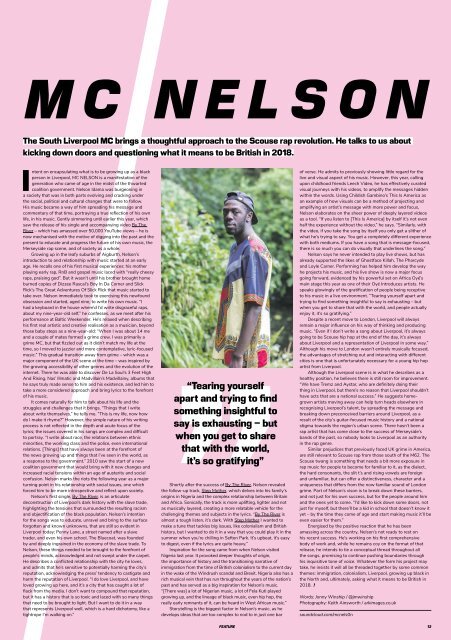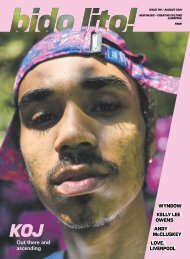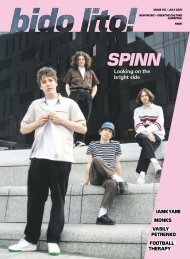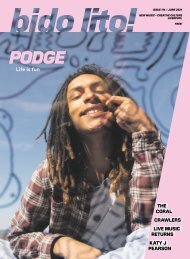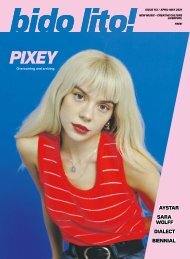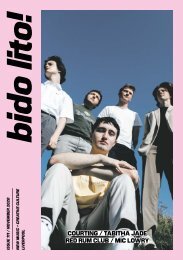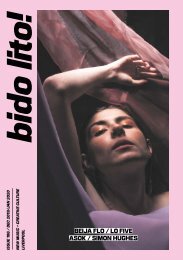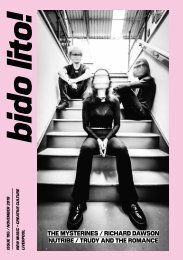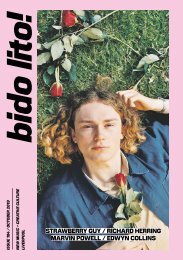Issue 90 / July 2018
July 2018 issue of Bido Lito! magazine. Featuring: MC NELSON, THE DSM IV, GRIME OF THE EARTH, EMEL MATHLOUTHI, REMY JUDE, LIVERPOOL BIENNIAL, CAR SEAT HEADREST, THE MYSTERINES, TATE @ 30 and much more.
July 2018 issue of Bido Lito! magazine. Featuring: MC NELSON, THE DSM IV, GRIME OF THE EARTH, EMEL MATHLOUTHI, REMY JUDE, LIVERPOOL BIENNIAL, CAR SEAT HEADREST, THE MYSTERINES, TATE @ 30 and much more.
Create successful ePaper yourself
Turn your PDF publications into a flip-book with our unique Google optimized e-Paper software.
MC NELSON<br />
The South Liverpool MC brings a thoughtful approach to the Scouse rap revolution. He talks to us about<br />
kicking down doors and questioning what it means to be British in <strong>2018</strong>.<br />
Intent on encapsulating what is to be growing up as a black<br />
person in Liverpool, MC NELSON is a manifestation of the<br />
generation who came of age in the midst of the thwarted<br />
coalition government. Nelson Idama was burgeoning in<br />
a society that was in both parts evolving and cracking under<br />
the social, political and cultural changes that were to follow.<br />
His music became a way of him spreading his message and<br />
commentary of that time, portraying a true reflection of his own<br />
life, in his music. Gently simmering until earlier this year, which<br />
saw the release of his single and accompanying video By The<br />
River – which has amassed over 50,000 YouTube views – he is<br />
now mechanised with the motive of digging into the past and the<br />
present to educate and progress the future of his own music, the<br />
Merseyside rap scene, and of society as a whole.<br />
Growing up in the leafy suburbs of Aigburth, Nelson’s<br />
introduction to and relationship with music started at an early<br />
age. He recalls one of his first musical experiences: his mother<br />
playing early rap, RnB and gospel music laced with “really cheesy<br />
raps, praising god”. But it wasn’t until his brother brought home<br />
burned copies of Dizzee Rascal’s Boy In Da Corner and Slick<br />
Rick’s The Great Adventures Of Slick Rick that music started to<br />
take over. Nelson immediately took to exercising this newfound<br />
obsession and started, aged nine, to write his own music. “I<br />
had a keyboard in the house where’d I’d write disgraceful raps,<br />
about my nine-year-old self,” he confesses, as we meet after his<br />
performance at Baltic Weekender. He’s relaxed when describing<br />
his first real artistic and creative realisation as a musician, beyond<br />
those baby steps as a nine-year-old: “When I was about 14 me<br />
and a couple of mates formed a grime crew. I was primarily a<br />
grime MC, but that fizzled out as it didn’t match my life at the<br />
time, so I moved to jazzier and more contemplative, lyric-focused<br />
music.” This gradual transition away from grime – which was a<br />
major component of the UK scene at the time – was inspired by<br />
the growing accessibility of other genres and the evolution of the<br />
internet. There he was able to discover De La Soul’s 3 Feet High<br />
And Rising, Nas’ Illmatic and Madvillain’s Madvillainy, albums that<br />
he says truly made sense to him and his existence, and led him to<br />
take a more considered approach and bring lyrics to the forefront<br />
of his music.<br />
It comes naturally for him to talk about his life and the<br />
struggles and challenges that it brings. “Things that I write<br />
about write themselves,” he tells me. “This is my life, now how<br />
do I make it rhyme?” However, the simple nature of his writing<br />
process is not reflected in the depth and acute focus of the<br />
lyrics; the issues covered in his songs are complex and difficult<br />
to portray. “I write about race, the relations between ethnic<br />
minorities, the working class and the police, even international<br />
relations. [Things] that have always been at the forefront of<br />
the news growing up and things that I’ve seen in the world, as<br />
a response to the government.” 2010 saw the start of a new<br />
coalition government that would bring with it new changes and<br />
increased racial tensions within an age of austerity and social<br />
confusion. Nelson marks the riots the following year as a major<br />
turning point in his relationship with social issues, one which<br />
forced him to be more introspective and reflect upon society.<br />
Nelson’s first single, By The River, is an articulate<br />
deconstruction of Liverpool’s dark history with the slave trade,<br />
highlighting the tensions that surrounded the resulting racism<br />
and objectification of the black population. Nelson’s intention<br />
for the songs was to educate, unravel and bring to the surface<br />
forgotten and known unknowns, that are still so evident in<br />
Liverpool today; Penny Lane, a street named after a slave<br />
trader, and even his own school, The Bluecoat, was founded<br />
by and deeply ingrained in the economy of the slave trade. To<br />
Nelson, these things needed to be brought to the forefront of<br />
people’s minds, acknowledged and not swept under the carpet.<br />
He describes a conflicted relationship with the city he loves,<br />
and admits that he’s sensitive to potentially harming the city’s<br />
reputation, acknowledging the press’ tendency to castigate and<br />
harm the reputation of Liverpool. “I do love Liverpool, and have<br />
loved growing up here, and it’s a city that has caught a lot of<br />
flack from the media. I don’t want to compound that reputation,<br />
but it has a history that is so toxic and laced with so many things<br />
that need to be brought to light. But I want to do it in a way<br />
that represents Liverpool well, which is a hard dichotomy, like a<br />
tightrope I’m walking on.”<br />
“Tearing yourself<br />
apart and trying to find<br />
something insightful to<br />
say is exhausting – but<br />
when you get to share<br />
that with the world,<br />
it’s so gratifying”<br />
Shortly after the success of By The River, Nelson revealed<br />
the follow-up track, Step Mother, which delves into his family’s<br />
origins in Nigeria and the complex relationship between Britain<br />
and Africa. Sonically, the track is more uplifting, lighter and not<br />
as musically layered, creating a more relatable vehicle for the<br />
challenging themes and subjects in the lyrics. “By The River is<br />
almost a tough listen, it’s dark. With Step Mother I wanted to<br />
make a tune that tackles big issues, like colonialism and British<br />
history, but I wanted to do it in a way that you could play it in the<br />
summer when you’re chilling in Sefton Park. It’s upbeat, it’s easy<br />
to digest, even if the lyrics are quite heavy.”<br />
Inspiration for the song came from when Nelson visited<br />
Nigeria last year. It provoked deeper thoughts of origin,<br />
the importance of history and the transitioning narrative of<br />
immigration from the time of British colonialism to the current day<br />
in the wake of the Windrush scandal and Brexit. Nigeria also has a<br />
rich musical vein that has run throughout the years of the nation’s<br />
past and has served as a big inspiration for Nelson’s music.<br />
“[There was] a lot of Nigerian music, a lot of Fela Kuti played<br />
growing up, and the lineage of black music, even hip hop, the<br />
really early remnants of it, can be heard in West African music.”<br />
Storytelling is the biggest factor in Nelson’s music, as he<br />
develops ideas that are too complex to nod to in just one bar<br />
of verse. He admits to previously showing little regard for the<br />
live and visual aspect of his music. However, this year, calling<br />
upon childhood friends Leech Video, he has effectively curated<br />
visual journeys with his videos, to amplify the messages hidden<br />
within the words. Using Childish Gambino’s This Is America as<br />
an example of how visuals can be a method of projecting and<br />
amplifying an artist’s message with more power and focus,<br />
Nelson elaborates on the sheer power of deeply layered videos<br />
as a tool. “If you listen to [This Is America] by itself it’s not even<br />
half the experience without the video,” he says. “Similarly, with<br />
the video, if you take the song by itself you only get a slither of<br />
what he’s trying to say. You get a completely different experience<br />
with both mediums. If you have a song that is message-focused,<br />
there is so much you can do visually that underlines the song.”<br />
Nelson says he never intended to play live shows, but has<br />
already supported the likes of Ghostface Killah, The Pharcyde<br />
and Loyle Carner. Performing has helped him develop the way<br />
he projects his music, and his live show is now a major focus<br />
going forward, evidenced by his powerful set on Africa Oyé’s<br />
main stage this year as one of their Oyé Introduces artists. He<br />
speaks glowingly of the gratification of people being receptive<br />
to his music in a live environment. “Tearing yourself apart and<br />
trying to find something insightful to say is exhausting – but<br />
when you get to share that with the world, and people actually<br />
enjoy it, it’s so gratifying.”<br />
Despite a recent move to London, Liverpool will always<br />
remain a major influence on his way of thinking and producing<br />
music. “Even if I don’t write a song about Liverpool, it’s always<br />
going to be Scouse hip hop at the end of the day, it’s always<br />
about Liverpool and a representation of Liverpool in some way.”<br />
Although his move to London wasn’t entirely musically focused,<br />
the advantages of stretching out and interacting with different<br />
cities is one that is unfortunately necessary for a young hip hop<br />
artist from Liverpool.<br />
Although the Liverpool scene is in what he describes as a<br />
healthy position, he believes there is still room for improvement.<br />
“We have Tremz and Aystar, who are definitely doing their<br />
thing in Liverpool, but there’s no reason that Liverpool shouldn’t<br />
have acts that are a national success.” He suggests homegrown<br />
artists moving away can help turn heads elsewhere in<br />
recognising Liverpool’s talent, by spreading the message and<br />
breaking down preconceived barriers around Liverpool, as a<br />
result of the city’s guitar-focused music history and a national<br />
stigma towards the region’s urban scene. There hasn’t been a<br />
rap artist that has come close to the success of Merseyside’s<br />
bands of the past, so nobody looks to Liverpool as an authority<br />
in the rap genre.<br />
Similar prejudices that previously faced UK grime in America,<br />
are still relevant to Scouse rap from those south of the M62. The<br />
Scouse twang is something that needs a bit more exposure in<br />
rap music for people to become for familiar to it, as the dialect,<br />
the hard consonants, the slit t’s and rising vowels are foreign<br />
and unfamiliar, but can offer a distinctiveness, character and a<br />
uniqueness that differs from the now familiar sound of London<br />
grime. Part of Nelson’s vison is to break down these barriers,<br />
and not just for his own success, but for the people around him<br />
and the ones yet to come. “I’d like to kick down some doors, not<br />
just for myself, but there’ll be a kid in school that doesn’t know it<br />
yet – by the time they come of age and start making music it’ll be<br />
even easier for them.”<br />
Energised by the positive reaction that he has been<br />
amassing across the country, Nelson’s not ready to rest on<br />
his recent success. He’s working on his first comprehensive<br />
body of work and, while he remains coy on the format of that<br />
release, he intends to tie a conceptual thread throughout all<br />
the songs, promising to continue pushing boundaries through<br />
his inquisitive tone of voice. Whatever the form his project may<br />
take, he insists it will all be threaded together by some common<br />
themes: immigration, colonialism, Liverpool, growing up black in<br />
the North and, ultimately, asking what it means to be British in<br />
<strong>2018</strong>. !<br />
Words: Jonny Winship / @jmwinship<br />
Photography: Keith Ainsworth / arkimages.co.uk<br />
soundcloud.com/mcnels0n<br />
FEATURE<br />
13


